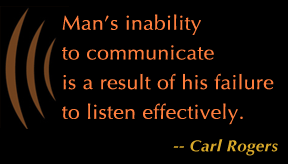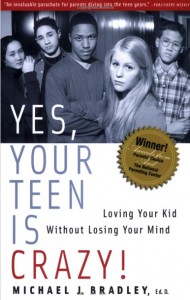 Many years ago I attended a powerful and memorable Reflective Listening workshop. The participants were asked to listen carefully as volunteers related a story about something in their lives the found disturbing or confusing. During the first stage of the exercise, the participants were instructed to warm-up their “listening muscles” by listening without any response or reaction whatsoever.
Many years ago I attended a powerful and memorable Reflective Listening workshop. The participants were asked to listen carefully as volunteers related a story about something in their lives the found disturbing or confusing. During the first stage of the exercise, the participants were instructed to warm-up their “listening muscles” by listening without any response or reaction whatsoever.
Tips for Effective Conflict Resolution
 Are you in the middle of a dispute – personal or professional?
Are you in the middle of a dispute – personal or professional?
Be aware that if your main goal is to win, blame or change the other party, the conflict will probably escalate, no matter what skills you use. Only begin a conversation about a conflict if you are truly open to learning something new and to problem-solving.
The irony of resolving conflicts or disputes is that the greatest leverage for change comes from listening to and understanding the other person’s point of view, NOT from convincing them you are right. When people feel listened to, they are more likely to try to understand you and your stance.
Learning New Dance Steps
 Marital therapists commonly speak of “relationship dances” when exploring the repetitive patterns of interaction that couples fall into, patterns that greatly limit their capacity to problem-solve. Some of the more common “dance steps” include the following:
Marital therapists commonly speak of “relationship dances” when exploring the repetitive patterns of interaction that couples fall into, patterns that greatly limit their capacity to problem-solve. Some of the more common “dance steps” include the following:
TOO Sensitive to Your Partner’s Needs??
 While couples frequently complain that their partners aren’t sensitive to their needs, I have observed many dissatisfied individuals presenting as OVER-sensitive to the other’s needs and feelings. Wanting to avoid hurting or “devastating” the other, they avoid confrontation altogether. In the most sensitive of areas – the sexual realm – couples will live together for decades, so enmeshed in one another’s feelings and in their need to maintain emotional stability, that what needs to be said is never said. And so, naturally, nothing changes.
While couples frequently complain that their partners aren’t sensitive to their needs, I have observed many dissatisfied individuals presenting as OVER-sensitive to the other’s needs and feelings. Wanting to avoid hurting or “devastating” the other, they avoid confrontation altogether. In the most sensitive of areas – the sexual realm – couples will live together for decades, so enmeshed in one another’s feelings and in their need to maintain emotional stability, that what needs to be said is never said. And so, naturally, nothing changes.
Critical Rules for Critical Conversations
 When all is said and done, we earn our teenagers’ trust by showing them we trust them, by being respectful, and by sharing power. Adolescents (and all children for that matter) who feel their parents are really interested in their world, feelings and experiences, are more likely to be open to learning from them.
When all is said and done, we earn our teenagers’ trust by showing them we trust them, by being respectful, and by sharing power. Adolescents (and all children for that matter) who feel their parents are really interested in their world, feelings and experiences, are more likely to be open to learning from them.
Do Love and Sex Belong Together?
 According to Christopher Ryan and Cacilda Jethá, authors of Sex at Dawn: The Prehistoric Origins of Modern Sexuality (2010), and a psychologist and practicing psychiatrist, respectively, men and women aren’t meant to be in lifelong monogamous unions. In their attempt to explain the high divorce rates in the western world, they argue that monogamy is in direct confrontation with the evolved reality of our species.
According to Christopher Ryan and Cacilda Jethá, authors of Sex at Dawn: The Prehistoric Origins of Modern Sexuality (2010), and a psychologist and practicing psychiatrist, respectively, men and women aren’t meant to be in lifelong monogamous unions. In their attempt to explain the high divorce rates in the western world, they argue that monogamy is in direct confrontation with the evolved reality of our species.
How Do I Know Mine is a Healthy Relationship?
 Montreal psychotherapist Rhonda Rabow discusses what is reasonable to expect from a healthy relationship and what is asking too much. What behaviors, she asks, are red lights to be paid attention to before a long-term commitment is made, and what behaviors are part of the workings of real relationships and can be forgiven?
Montreal psychotherapist Rhonda Rabow discusses what is reasonable to expect from a healthy relationship and what is asking too much. What behaviors, she asks, are red lights to be paid attention to before a long-term commitment is made, and what behaviors are part of the workings of real relationships and can be forgiven?
The Pause that Refreshes
 Many of us, possibly most of us, find it challenging not to react immediately to various triggers without anger, irritation, or defensiveness. Rather than take the time to contemplate and reflect, we react much like Pavlov’s conditioned dogs. And thus we go through life, repeating the same script over and over, with little awareness that we have the choice to respond differently.
Many of us, possibly most of us, find it challenging not to react immediately to various triggers without anger, irritation, or defensiveness. Rather than take the time to contemplate and reflect, we react much like Pavlov’s conditioned dogs. And thus we go through life, repeating the same script over and over, with little awareness that we have the choice to respond differently.